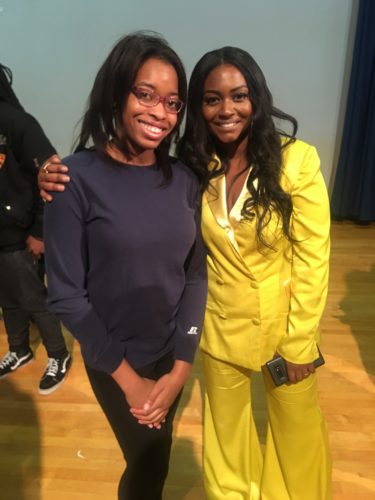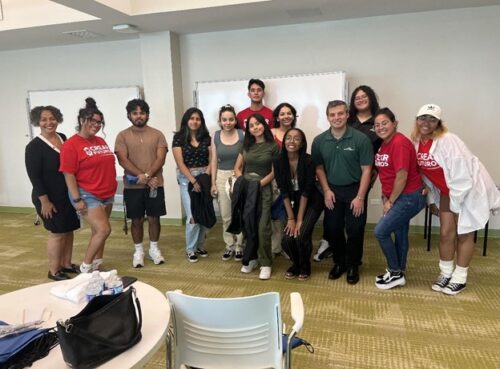
Photo Credit: Random Student (picture was taken on my phone)
Nicole Paultre Bell-Earle, a social justice activist and former fianceé of Sean Bell paid a visit to SUNY Old Westbury to talk to students about her life after Sean’s death and the road to fight for justice in celebration of Black History Month. The Discussion was sponsored by the Black Student Union, Student Government Association, Campus Activities Board, and First Year Experience. After concluding the discussion, I got a chance to interview her privately about Sean and her efforts to fighting for his name and legacy.
Every year, you and your family always celebrate the life of Sean Bell. How are you today mentally/spiritually?
Mentally I would say, I am strong. We have spent twelve years of learning how to overcome something that was in our way that we never expected. I spent a lot of time with my family, Sean’s religious family. Even from the first day, we face this terrible tragedy. The first thing I do is pray, even till this day. Before I speak, I pray. Prayer has taken me a long way.
How do you go about your day-to-day life now since Sean passed away?
I am a real estate agent, an activist and also a public speaker. So what I do, everything that I am involved in no matter what it is, I have to do it with my whole heart. I have to do it with prayer. Right now, I spent several years of finding out who Nicole was. When Sean was killed, a part of me died with him and then Nicole Bell was born. I would like to say right now, I’m a little bit more serious than I was back then and that’s probably because of everything that we faced. Realizing that life doesn’t always go planned. But, I probably would say that right now, having support from people like yourself, the students here at your college, and the community really helps me to push forward and move forward. And it helps me be able to raise my daughters. I spent a lot of years repairing myself. You can’t learn to love again if you don’t love yourself and that was what I had to do. I had to learn how to love myself and be able to move forward because if you get into a relationship and you’re broken, all you’re going to do is break someone else. You gotta learn to love yourself before you move forward.
How do you help both of your daughters dealing with the aftermath of their father’s death?
Thank god that we’re surrounded by a strong family. Sean’s father is very instrumental in my daughters’ lives. My father is very instrumental in their lives. As well as my new husband, he’s also instrumental and making sure they’re safe and protected. We are surrounded by a group of amazing men. Of course, no one can ever replace their dad. My family is so strong. I encourage my daughters everyday, especially Jada, she’s the oldest, she knows the most, that things happen in life and no we don’t always find the reason why it happens. But we have to learn how to push forward, how to overcome, how to react to it. Things are gonna come. Even after Sean, things come into my life, challenges that I don’t necessarily have an answer for. But, we have to learn how to react and control.
How do you feel about the Black Lives Matter Movement that now exists and others being informed about the Sean Bell’s story?
I’m happy that there are movements. There’s Mothers of the Movement, there’s so many other organizations such as Black Lives Matter who are now really hitting the streets, making noise. I really feel that Sean’s case, his tragedy was one that rejuvenated the Civil Rights Movement. Before that, there weren’t too many movements going on. I think when Sean was killed, that was New York’s last time that they were gonna allow this to happen and go quiet. And then there was Eric Garner, and then after Eric Garner, everyone was marching. We’re creating Black Lives Matter, there’s Trayvon Martin. There’s Ramarley Graham. There’s so many people and mothers that I’ve known. All of these things really help me to be able to move forward.
Have you reached out to other social activists that went through the same situation as you?
Yes! I have a great relationship with Sabrina Fulton (Trayvon Martin’s mother), Kadiatou Diallo (Amadou Diallo’s mother), Ramarley Graham’s mom Constance, they’re from the Bronx, Eric Garner’s mother Gwen Carr. I’m close with Sandra Bland’s mom. All of these women are in my phone. If I send them a text right now, occasionally, we’re all in a different space but I send them a message. The mothers release it together (The Mothers of the Movement) and I’m so proud of that.
Do you feel that justice will be served in any day since the three detectives aren’t found guilty?
I feel that when officers began to be held accountable for their criminal actions then we will see a change. Until then unfortunately, this is gonna continue to happen. It has! It has happened every time since Sean Bell. There was an acquittal for Sean Bell and ever since then, we see the same thing played out over and over again. Until we have a jury that convicts an officer for wrongdoing or a judge who convicts an officer for what he’s done, we’re gonna continue to see this. And that’s unfortunately, that’s the statistics to prove that. Numbers don’t lie.
How do you respond to the news of an officer recently sentenced to six and a half years in prison for the murder of Laquan McDonald?
It’s still another measure of injustice. We know that right now when someone goes and shoot someone in the street, you’re gonna get more than that. Police Officers don’t need a tap on their wrists. They weren’t drafted into the job. They took this job because they felt that they were prepared and the state that hired them, felt that they were prepared for that job. So when you commit a crime and you do something you were not trained to do or you take it upon yourself to do some kind of racist act towards someone, you gotta pay for it. Again, that was a tap on the wrist. It was a slap on the wrist. These baby steps aren’t getting us anywhere. We need someone thats gonna take a lead and give them the time that they deserve.
Do you think that Sean was murdered because of his race or was it more of an accident or mistake?
There’s a big blue wall of silence that is a large part of the problem. That wall of silence and when one officer witness and another doing something that is wrong or criminal, they don’t speak up on it and that’s that wall. There’s white, there’s black, and there’s blue. And that’s what I see. I think that when officers going to the force, certain neighborhoods, they’re policing those neighborhoods. They’re aggressive. Sean was stopped twice the night he was celebrating his bachelor party. Why? Why? He didn’t commit a crime. He had the civil right to be there, he had a civil right to go home peacefully. So that blue wall of silence is a huge problem and no matter what color you are, that wall is something that we always have to fight against. To make sure that the police officers who are good police officers who are doing what they suppose to do to get the bad ones out.
Do you keep in contact with the two other men that was involved in the incident? How are they?
Sean’s friends occasionally will reach out. We were never really close friends. We were sort of Sean’s friends through the neighborhood. We occasionally speak, but no. It’s not like an everyday thing. We do reach out through family, our families and friends. I know that Joe lives down south and he’s traumatized. Trent and Joe, they’re both traumatized. Joe was shot seventeen times and still has bullets inside of him. It’s a constant battle not only for me, not only for my family, but for their’s too. They were traumatized. They watched their friend die right next to them.
What is your advice to other families who are going through the same situation you and your family went through?
My advice for families who are going through what we’ve went through is you are not alone. We have to stick together. We have to continue to fight. Twelve years from now, we want them to also be right where I am, out there speaking and standing. Getting changes and laws made in the name of the loved ones. I want the loved ones of victims to know that your world is not over and know that it should have not happened and it’s gonna hurt like hell for a long time. But the more you do to fight for your loved one, the better it will become. I always say that it never goes away, we just learn how to live with it.
Is there anything that you are working on as far as keeping Sean’s name and memory alive?
Right now, I’m in contract for the Sean Bell movie. It will be in the big screen one day so we’re working towards it. Look out for that! Things like that will last forever, even when I’m gone. We have Sean Bell Way, a street in Jamaica, Queens named after him. So many times we drive down these streets, we don’t know who these streets are named after. But, when I’m long gone, things like the movie and things like his street, things like the laws that we had changed, the policies that we had changed within the police departments, those things will be there. That’s what my goal is. So when I’m gone and my kids grow up, and they have kids and they have kids, our legacy is cemented and Sean’s legacy is cemented.







